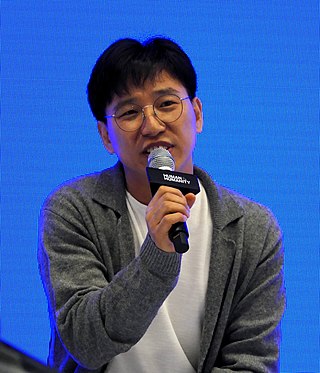Related Research Articles
Ahn Soo-kil (1911–1977) was a Korean novelist and journalist who devoted much of his life to depicting the lives of the Korean settlers in Jiandao,Manchuria.

Kim Won-il is a South Korean writer.
Seonu Hwi was a South Korean author and novelist.
Kim Yong-man is a modern South Korean poet.
Kwak Jae-gu is a South Korean modern poet.
Kim Kyung Ju is a South Korean poet and performance artist.
Kim Eon is a South Korean poet.
Kim Byeong-eon is a Korean writer.
Kim Byeol-ah is a South Korean writer.
Han changhoon is a South Korean author.
Hong Sung-won was a Korean author
Jang Jeongil is a South Korean poet,playwright,and novelist.
Seo Hajin (Korean: 서하진),born in 1960,is a South Korean writer.

Paik Gahuim is a modern South Korean writer known for his disturbing stories.
Kwon Yeo-sun is a South Korean writer.

Shin Yong-Mok is a South Korean poet.
Sim Yunkung is a South Korean writer.
Song Gisuk was a South Korean writer of novels,short stories,and essay.
Lee Jangwook is a South Korean poet,novelist,and critic.

Jang Seoknam is a South Korean poet.
References
- ↑ "구효서 " biographical PDF available at: http://klti.or.kr/ke_04_03_011.do# Archived 2013-09-21 at the Wayback Machine
- ↑ "구효서 " LTI Korea Datasheet: http://klti.or.kr/ke_04_03_011.do# Archived 2013-09-21 at the Wayback Machine
- ↑ "구효서 " LTI Korea Datasheet: http://klti.or.kr/ke_04_03_011.do# Archived 2013-09-21 at the Wayback Machine
- ↑ "구효서 " LTI Korea Datasheet: http://klti.or.kr/ke_04_03_011.do# Archived 2013-09-21 at the Wayback Machine
- ↑ "구효서 " LTI Korea Datasheet: http://klti.or.kr/ke_04_03_011.do# Archived 2013-09-21 at the Wayback Machine
- ↑ "구효서 " LTI Korea Datasheet: http://klti.or.kr/ke_04_03_011.do# Archived 2013-09-21 at the Wayback Machine
- ↑ "구효서 " LTI Korea Datasheet: http://klti.or.kr/ke_04_03_011.do# Archived 2013-09-21 at the Wayback Machine
- ↑ "서비스공지 | 서비스공지 | 고객센터".